The hype around “scariants” is overblown, but we also shouldn’t be too complacent. Here are five reasons why you shouldn’t panic about coronavirus variants. 

Real-world data out of Qatar suggests that the Pfizer vaccine works quite well, even against B.1.351. Full vaccination offered 75% protection, still “a miracle,” says Andrew Read, a disease ecologist at @PennStateBio. 

While scientists testing vaccine efficacy often focus on antibodies, they are only “a very narrow slice” of what the immune response might be, says @drjenndowd. T-cells also help keep infections in check—and there’s data that the vaccines elicit good T-cell responses. 

While a vaccine that can block infection is wonderful, the most important factor is keeping people out of the hospital. 

Researchers see this as a hopeful sign. The virus may be running out of new ways to adapt to the current environment. scientificamerican.com/article/the-co… 

Moderna has already begun testing the efficacy of a booster shot aimed at protecting against two variants. Last week they released the initial results, demonstrating variant-specific boosters can work. investors.modernatx.com/news-releases/… 

READ the full story by @cwillyard to learn why you can be cautiously optimistic about these covid variants.
technologyreview.com/2021/05/13/102…
technologyreview.com/2021/05/13/102…
✅ Sign up for our free newsletter to stay up-to-date on how covid-19 is changing our world.
forms.technologyreview.com/newsletters/co…
forms.technologyreview.com/newsletters/co…
• • •
Missing some Tweet in this thread? You can try to
force a refresh







